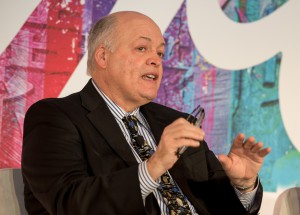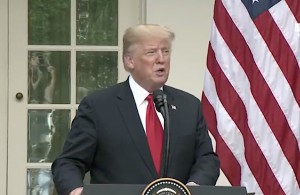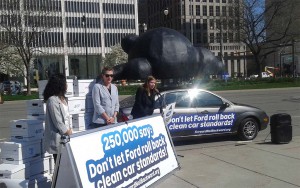
Jim Hackett, Ford president and CEO, said last week that his company was in favor of keeping the Obama administration fuel economy standards.
The public hearings on the Trump administration’s proposal to roll back corporate average fuel economy standards, or CAFE, headed to the Detroit area after officials spent a day in California getting blasted for the new standards.
The first hearing was held in Fresno, California, and saw a mix of local and state politicians as well as environmental groups take the administration to task for scaling the back the fuel economy standards to current levels until 2026 rather than keeping the 54.5 mpg standard expected for 2025.
“California will take whatever actions are needed to protect our people and follow the law,” Mary Nichols, chairwoman of the California Air Resources Board, testified at the hearing in central California, which has some of the nation’s worst air pollution.
Under the standards established under the Obama administration, the standard would rise to 36 miles per gallon (15 kilometers per liter) by 2025, which is 10 miles per gallon (4 kilometers per liter) higher than the current requirement. The goal was to reduce car emissions and save people money at the pump.
(California pushes ahead with promotion of zero-emission vehicles. Click Here for the story.)
Trump administration officials say waiving the tougher fuel efficiency requirements would make vehicles more affordable, which would get safer cars into consumers’ hands more quickly. California officials said the proposed rollback would harm people’s health and exacerbate climate change, pushing for the Trump administration back off.

President Donald Trump is looking to keep corporate average fuel economy levels lower than the Obama administration's.
“Stopping us from protecting our people, our jobs and economy or our planet is like trying to stop a mother from protecting her child,” said State Attorney General Xavier Becerra. During the meeting, environmentalists protested outside with signs reading, “Clean cars = Clean air” and chanting, “Clean cars now.”
“No one wins if our customers are not buying the new highly efficient products offered in our showrooms,” Steve Douglas, senior director of energy and environment for the Alliance of Automobile Manufacturers, said in written testimony for the hearing in Fresno.
“The standards must account for consumer willingness and ability to pay for newer technologies in order for all the benefits of new vehicles to be realized.”
(Click Here for more about California thumbing its nose at Trump on Clean Air Standard.)
The group represents General Motors, Ford, Fiat Chrysler, Volkswagen, BMW and other automakers. While some favored the Trump administration’s plans initially, after a rethink they all decided it was better to stick to the Obama administration rules.
That sentiment was reiterated by Ford and Fiat Chrysler officials during the hearing in Dearborn today.

Automakers are caught in the middle over the CAFE debate and could face even more challenges if the proposed Trump rollback drags on in court.
“FCA supports the policy choice in favor of ongoing fuel economy improvements in the fleet, but that policy needs to be based on market realities as they have evolved since 2012,” FCA’s vice president of global fuel economy Steve Bartoli said in testimony Tuesday.
“In business and in government, we have to make decisions based on the best information available to us at the time, but we also must be nimble enough to adjust our plans when the facts on the ground change.”
Ford’s global director of sustainability and vehicle environmental matters, Bob Holycross, supported the sentiment, saying Ford is not in favor of “standing still.”
“We need a consistent, stable regulatory framework in which to make these capital-intensive investments, including policies that will help drive demand for emerging technologies,” he said.
(To see why auto suppliers are growing pessimistic about near-term prospects, Click Here.)
The last of the three hearings will be held in Pittsburgh. In the meantime, California and other states have sued to block any changes to Trump’s proposal. The administration also wants to revoke California’s authority to set its own mileage standards.

What a spineless group! Even their new statements in support of the Obama rising standard are bland oatmeal.
I would say give them what they ask for except that customers (we, not them) will unnecessarily pay many $thousands more for advanced technology and materials to meet the higher standard.